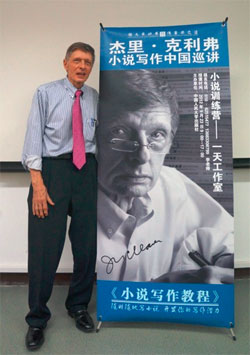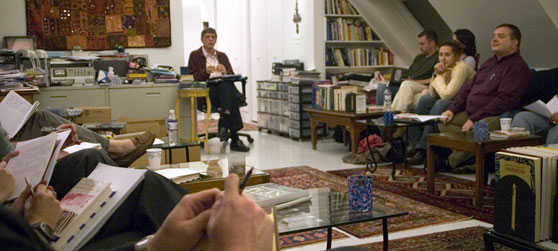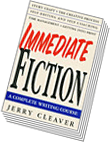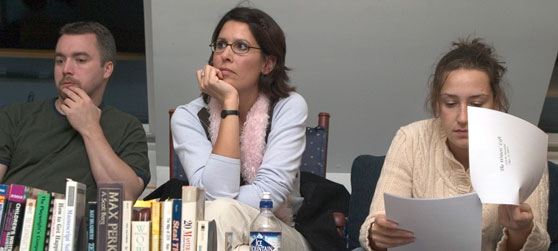
THE WRITERS LOFT WORKSHOP IS NOW AN ONLINE COURSE. FIRST CLASS IS FREE TO TRY.
To get started email me at:
Is this you?
You want to write but you have no time.
When you do find time, you just can't drag yourself to the desk.
If you do get going, your writing starts strong, but becomes such a mess you don't know whether to keep working or dump it all and start something new.
You write lots of bits and pieces, but none of them fit together into a meaningful whole.
You have training (workshops, college courses, or even a degree in creative writing) but little or nothing you write gets published.
You haven't taken a class because you're not sure where to turn or what to do first. One thing you do know is you want to get the right start so you don't waste a lot of time working on things that don't matter.
GET SOLUTIONS to these and any other writing problems.
Jerry in China

Jerry’s book, Immediate Fiction, is the bestselling writing book in China. Here’s the banner they used on his book tour to Beijing and Shanghai where he gave student seminars at the five major universities plus special professional writers and writing professors conferences and writing teachers' workshops.
Is this you?
You want to write but you have no time.
When you do find time, you just can't drag yourself to the desk.
If you do get going, your writing starts strong, but becomes such a mess you don't know whether to keep working or dump it all and start something new.
You write lots of bits and pieces, but none of them fit together into a meaningful whole.
You have training (workshops, college courses, or even a degree in creative writing) but little or nothing you write gets published.
You haven't taken a class because you're not sure where to turn or what to do first. One thing you do know is you want to get the right start so you don't waste a lot of time working on things that don't matter.
GET SOLUTIONS to these and any other writing problems.
Jerry in China

Jerry’s book, Immediate Fiction, is the bestselling writing book in China. Here’s the banner they used on his book tour to Beijing and Shanghai where he gave student seminars at the five major universities plus special professional writers and writing professors conferences and writing teachers' workshops.
Stay up to date with me and my new books at:
Carleneoconnor.netOnly one workshop (originated in Chicago) has mentored 40+ novels and 5 nonfiction titles into print by major publishers — plus an Emmy winner.
Taught by NY Times bestselling author Mary Carter, The Writers’ Loft gives writers of all levels the crucial skills that make every story and every writer a success. Learn everything you need to unlock your imagination and bring your ideas to life on the page, stage, or screen.
MORE THAN A WORKSHOP, The Writers’ Loft is a writer's community. It's a place for you to be with other writers, have your work presented, and get the support, guidance, and coaching you need to write successfully in all genres and all media, including novels, short stories, screenplays, stage plays, biography, memoir, nonfiction. Plus you get insider help and advice on how to market your work and how to make those all-important connections to agents, editors, and publishers.

Jerry Cleaver created The Writers’ Loft 20 years ago. It’s been turning out published authors ever since.
Jerry Cleaver

Author of St. Martin’s Press’ five-star, best selling book Immediate Fiction
Teacher of Professional Fiction at Northwestern University for ten years.
Teacher of special seminars for Writer's Digest, published articles in the Writer's Digest Magazine, and featured in the Writer's Digest Yearbook.
Creator of the worldwide "Write Your Novel Now" online course (students in Alaska, New Zealand, Turkey, Hong Kong, Singapore, Australia, Ireland, England, Canada, India).
Creator and leader of the Fiction Writing for Lawyers seminar series.
Very sadly, Jerry is no longer with us. He is greatly missed by his family, friends and students. (Read more here.)
At the request of Jerry and his family, writer and teacher Mary Carter has come to Chicago to carry on his work at the Writers’ Loft.
Mary Carter

I followed Jerry Cleaver’s unique course when I was writing my first novel, She'll Take It (Kensington Books). It was published in 2006 and since then I have published over 22 titles and have become a USA Today bestselling author under my pen name Carlene O'Connor. My work has been translated into 7 languages, and my anthologized novellas were New York Times bestsellers for several weeks in a row. You can read more about me at marycarterbooks.com or carleneoconnor.net
I received personal training from Jerry in his Writers’ Loft workshop methods, and since then I have been leading successful workshops in New York and Wilmington, North Carolina. Jerry continued to train, coach and mentor me the whole time.
I am honored and thrilled to be chosen as the only person other than Jerry ever to teach at the Writers’ Loft. I feel a special responsibility to Jerry — and to Writers’ Loft students.
I follow Jerry's methods closely because I know from my own experience as a writer that they work. And I know from my experience as a teacher that they can work for you. That's why I strive to match the dedication, enthusiasm, empathy and insight that Jerry showed me — and every student.
Here's the thing — you can try The Writers’ Loft workshop with me for free. Just come to the first class and see what you think. You don't pay anything unless you return for the next class. So why not? To sign up, email me at mary@immediatefiction.com. Sessions fill up fast!
"After being stuck for years, I am now 150 pages into my first draft. Mary created just the right atmosphere." Martin Gavin, President of NYC's StarCom
"Mary Carter is a gifted writer and incredibly talented coach/mentor/instructor." Megan Cunningham, CEO/Founder of Magnet Media, Inc
"Mary efficiently revived my writing career." Craig Dixon, author of "Notes by a Nomad" and "Shorts"
Six 21/2 hour workshop sessions, plus all the help you need outside of class.
Each session meets from 7:00 PM to 9:30 PM. Each class consists of three things:
Specific story techniques presented and explored through examples and discussion.
Presentation of writing with feedback and coaching using Jerry's innovative feedback techniques. Mary reads your writing to the class, anonymously, so no one is put on the spot or forced to present their own writing.
In-class writing. The last half hour is committed to writing, using your own idea or one of the dramatic setups provided.

Each class ends with this half hour of writing to put you into the process of writing, get you loosened up, and create some momentum that will carry over to the outside. One Writers’ Loft student took a class exercise and expanded it into a novel (The Leaving Summer by Donal Harding) that was published by William Morrow. Another student entered 21 pages of her in-class writing in the Illinois Arts Council Awards and won $7,000.
Story
A good story cannot be denied. Like falling in love, it's irresistible. It touches your heart before it reaches your head. You're drawn in — whether you want to be or not. And you're not asking yourself, "Is it good?" or "Is it real?" because you're part of the story, living and feeling it with the characters. That's the kind of story you'll learn to write in The Writers’ Loft. The craft and techniques you'll learn are those used by all great writers.
Fine. But how does it work?
A Touch of Craft
Here's an example that will give you a feel for the most critical story ingredient of them all. It's the single force that will turn any idea into a dramatic story every time. Without it no story, no matter how beautifully written, can succeed. I can do this in a couple of ways. I can give you a definition, a concept, a model. But, stories aren't ideas. They're not concepts or definitions. They're experience. So, rather than tell you how a story works, I'm going to show you—show you by giving you a little story to see how much of an experience I can cause you to have. Here's the story:
My wife and I have a friend named Larry who just went through a horrendous divorce. My wife ran into him at the mall. He looked terrible—sad and despondent. He sounded even worse than he looked, so she invited him over for dinner to try to cheer him up.
Larry's an old friend, so we know what he likes. My wife cooked his favorite food and I bought a bottle of his favorite scotch. We had a nice dinner and let Larry know we would be there for him whenever he needed us. He could call anytime night or day. No matter what, we would be there to help him through this. Larry felt better. We felt better. He went home happy. We went to bed happy. It was a great night, all around, for everybody. That's the end of the story.
How was it? Moving? Compelling? Dramatic? Did you identify? Were you gripped? Did you have the kind of experience you want from a story?
The answer, of course, is NO. You did not have an experience. You did not connect. You did not identify. You could not. The reason you could not was: I purposely gave you a dead story. So, the effect was boredom and maybe irritation. The cause was a dead story. I presented you with an experience that left you cold, with a mistake. Why? Because mistakes are what we start with.
We make mistakes, constantly. First drafts are loaded with them. Hemingway said, "The first draft is shit." If Hemingway's first drafts were shit, you shouldn't be expecting any better from yourself. Expecting too much is the surest way to get discouraged and blocked. The other reason I started with a mistake is: We learn more from our mistakes than our successes—not from the mistakes themselves, but from fixing them. Experiencing perfect writing will not teach you what you need to know. If it did, all you would have to do is read great writers and you'd be a great writer. I know people who read great literature all the time but can't write worth a damn.
Fine. So where do we go from here? Well, if I'm right, if I know what I'm doing, I should be able to show you how to turn this mistake into an involving story. But, before I do, consider...
Next: Making It Happen
Making It Happen
What's needed to turn this dead story into something with some energy, some drama? Detail, dialogue, emotion? Well, I could give you reams of detail and keep it as dull as it is. Dialogue? I could have them talking all night and far into the next day and you would be even more bored than you were. Emotion? Well, it has emotion. We're happy, satisfied, fulfilled. How much more do you want of happy, happy, happy?
Before I give you my answer, why don't you work on one of your own. See what you can do to give this dead story some energy. Think about what you could do, or you can actually write it out. You can write the whole thing out or you can just jot down some general ideas about how it should go—plan it out without doing it word for word.
Here's another version of the same story. See if I can get you more involved. In this version...
I've got a touch of bronchitis or flu the day Larry is coming for dinner. I'm not feeling great, so I stay home to rest up so I won't let Larry down.
Now, the flu is a minor detail, but I want you to decide whether you want it in or out. You don't have to have a reason—just a feeling. A few people usually go for the flu, but not many. Remember, this is not flu we're talking about. This is story and in story, everything counts. Nothing is along for the ride. So, the flu is in.
Larry comes over. We have a few drinks. He and my wife are both smokers. Before we get to dinner, they run out of cigarettes. "I'll go get them," I say. "I want to get out of this haze and clear my lungs."
Smokers is the next element. Yes or no? A few more go for it than the flu.
OK, so I head out for the corner store to get their smokes. It's a nice walk. I get their cigarettes and head back, but instead of walking up the front walk, I decide to take the shortcut down the alley.
OK, next item: Alley in or out? Pretty much everybody goes for the alley. Why? The answer to that is at the very heart of successful storytelling. It's not alley, not flu, not smokers. It's story.
So, I'm walking down the alley, relaxing, breathing fresh air, looking at the yards. Now, our kitchen sticks out from the back of the house and has a window in which I can see Larry and my wife. As I come through the yard, I see they're having a rather intense conversation. My wife is especially lively. I haven't seen her that bubbly in months.
OK, what's on your mind right now? What are you thinking? Let me guess. You're thinking, hanky-panky, fooling around, touching, embracing, kissing, etc. Right? Not only are you thinking it, but you're wanting it. Oh, yes. Not only do you give me the flu, make me walk down the alley, but you throw my marriage into crisis by making my wife unfaithful. Maybe not in reality, but in story, we prefer cheating to loyalty—always. We want chemistry, passion, fireworks! You don't go to the amusement park to ride the merry-go-round. You go to ride the roller coaster.
Next: The Active Ingredient
The Active Ingredient
I knew what you were thinking, not because I read your mind, but because I know how people work and how stories work. I led you there—with story. I gave you an experience that hooked you in. Something you can learn to do every time by mastering the story craft.
Fine, so far, but where do we go from here? We left me standing there, watching my wife talking to Larry. What's next? Well, I've raised your expectations, so I have to give you what you want—or something better. Let's go with the kiss.
My wife says something. Larry laughs, opening his arms. They embrace and have a nice long kiss.
What now? She kisses Larry. End of story. Yes? No? Why not? I'm sure you know in your heart, it's not over. Your heart is a good guide. It might be enough for an obvious example like this—might be. But when it's not obvious, when it gets subtle and tricky, when you get lost, it's never enough. To be a successful storyteller, you have to know in story terms, why it's not over. So, what has to happen to complete this story, to give it a bang-up ending? How about this:
I figure, "Heck with it. What do I care? Everybody cheats. Look at Clinton." Then I go in, we have a nice dinner, pledge our friendship to Larry, and wind up good friends just like before.
A satisfying ending? Maybe the characters are satisfied, but we are not and no reader will be either. All right. If this story is going to hold someone, I have to care, to feel betrayed, and go in and do something about it. Stories are about doing, always. It could go like this:
"Hi, guys," I say happily as I come in. "Here's the smokes."
They thank me and both light up. Larry pours himself some scotch.
"How'd it go while I was gone?" I say, flopping into a kitchen chair.
"Fine," my wife says.
"How about you, Lar? Enjoy yourself in my absence?"
He glances at my wife. "I did," he says.
"Good. I was worried you might get lonely. But when I saw you through the window, I could see you didn't need me to entertain you."
"Well," Larry says. "We both missed you and we're glad you're back."
"That's right, honey," my wife says. "It's not the same without you."
"Of course not," I say. "Say, hand me the butcher knife, darling."
"Butcher knife, what for?"
"No reason. I just feel like holding it."
"Don't be silly," she says.
"No, really. Indulge me."
"Will you stop," she says.
"Stop what? You don't trust me with a knife? What is this: No sharp objects for the lunatic?"
"Very funny," she says.
Larry stares at me, smiling weakly.
"Afraid I'll hurt myself — slit my wrists — or my throat? What do you think, Lar? Can I be trusted with a knife in my own kitchen with my best friend and my loyal wife?"
"Of course, you can," Larry says flatly, then downs his scotch.
"Damn right. Hear that, angel? Larry trusts me. He trusts you. We all trust each other. So pass me the knife, sweets."
Next: The Crucial Difference
The Crucial Difference
LIFEBLOOD OF EVERY STORY — AND EVERY WRITER
All right, let's stop here. The story's not over yet. It can go in many directions. Each writer will do it his or her own way. But no matter which way it goes it must fulfill the basic story requirements or it will fail.
For now, the question is: what's the difference between this last version and the first? Can you see it? It's not details. It's not dialogue. It's not emotion. I left it out when I raised this question earlier so you could experience it first. The first version — happy, happy, happy — left us cold. The last — trouble, trouble, trouble — got to us. What does that tell us?
It tells us that you must have conflict to create an engaging, compelling story. Conflict. We all know what conflict is, right? Your wife calls you an insensitive slob. You get run off the expressway on the way to work. Your boss tells you you'd better get your work up to par or you'll be out of a job. Your mother disinherits you.
Well, guess what, none of those is conflict, our kind of conflict — dramatic conflict. Oh, those examples are troubling, disturbing, upsetting, but none of them is what's needed to set a story in motion. They're false conflict. Trying to create a story from false conflict is like dragging a dead horse around a racetrack: You might get to the finish line, but you'll never win a race.
Even though every writing teacher and every writing book will tell you that conflict is the necessary ingredient, it remains the single, most misunderstood, most deceptive part of all storytelling. It's the reason why writers write as many duds as hits and why there are so many feeble stories limping around.
Conflict is deceptive because: All conflict is trouble but all trouble is not conflict. What we think of as conflict in everyday experience — disagreements, arguments, insults, shouting matches, even fistfights — are not dramatic conflict. They can be turned into dramatic conflict — anything can, once you know how — but dramatic conflict is a different creature entirely. Dramatic conflict is made up of several elements. Get one wrong, and no matter how brilliantly you write, your story will fall flat.
Because it is the source of everything that happens in story, understanding, creating, and using dramatic conflict is at the heart of The Writers’ Loft.
Conflict is critical but how your story is presented on the page is also critical. That brings us to our last example.
Next: You Can Do This
You Can Do This
That's the most important thing to keep in mind. Storytelling is an acquired skill and not an inborn talent. You don't have to be brilliant or write a brilliant story. You just have to master enough craft to tell a good enough story. Plenty of writers of average intelligence are making lots of money writing mediocre stories. Look around. They're not hard to find. Unlike the other arts (music, painting, dance, etc.) where you must have an inborn ability, to be a successful storyteller, you have what you need already. You don't have to know how to play the piano or paint a portrait to get along in the world, but you'd better understand yourself, how people work, how the world works if you're going to make it in this life. In fact, if you've survived this long, you have at least 10 novels in you. You have a full set of emotions and plenty of dramatic, painful, and exciting experience to draw on. That doesn't mean you have to write about yourself. Even if you're creating Martians, it all comes from your imagination. They're your Martians and your Martians are unlike all others.
You have what you need already, but you must learn how to use it. That means developing the skills to get in touch with your imagination and to bring it to life on the page. So, it's not what you have, but learning how to use it. All you need is the desire. The Writers’ Loft gives you everything else.
Classes are now forming. To register or for more information please email me at mary@immediatefiction.com or call 206.618.3747.
Close
You Also Get
Audio files that cover the critical elements of storytelling. Play them as you ride in your car or on your phone or iPod. The more you listen the more you learn. A great way to perfect your skills and technique while you're doing other things.
STORY HELP LINE. Call any time for help with any writing problem. Get the help you need when you need it. No need to wait until the next class. Call any time for personal help with any and every writing problem whether it's trouble with your story or yourself. Don't sit there and suffer. Remember no writing problem is too big to conquer and no problem is too small to disable you. This is Mary's specialty. Call any time and let Mary get you back on the track.
PERSONAL CONFERENCES. Unlimited personal conferences. Personalized help tailored to your needs of the moment and the future. Help finding your subject, setting your goals, and dealing with any other writing problems.
OUTSIDE WRITING HELP. Get feedback and coaching with outside writing. If you already have a story, you will get the coaching and guidance you need to get it into shape and off to market.
The first class is free. Any time you miss a class you are able to attend that class the next time it is presented.
FULL MARKETING STRATEGY. Taking one Writers’ Loft workshop entitles you to full marketing help and guidance - even if you're no longer in the workshop. Whenever you have a novel, short story, screenplay, or stage play ready, Mary will give you everything you need to market your work and help you short cut the submission process and get your story a serious read by agents, editors, and publishers.
What You Learn
STORY CRAFT AND TECHNIQUE. Plot, character, dramatic momentum. The source of all drama. The few dramatic forces that will turn any idea into a compelling story.
THE CREATIVE PROCESS. Overcoming doubt, fear, and panic. Techniques to overcome resistance, stop fighting yourself, and get the flow going the moment you sit down.
SELF-COACHING AND SELF-EDITING. Learn to stop torturing yourself when it doesn't come out the way you wanted. Learn to trust your own emotional radar to find that dramatic potential that's always in your work and learn how to use it to bring your story to life on the page every time.
REWRITING TECHNIQUES. Turning drudgery into excitement and inspiration. Rewriting is the best part. Once you know how, rewriting becomes re-exciting.
THE ESSENCE OF CHARACTER. What's needed to bring characters to life in all their depth and complexity. How to make the deepest, most personal connection to your characters.
SHORT STORY TO NOVEL, STAGE PLAY OR SCREENPLAY. How to turn any short story or story idea into the longer form without stressing, straining, or padding. Plus the easiest (and hardest) kind of novel to write and the easiest (and hardest) kind of novel to sell. What makes literature literature (exactly what it takes to write literary fiction.) How to write a bestseller. And how to write down-and-dirty, commercial fiction with the least pain and most pleasure in the least amount of time if that's your goal.
UNIVERSAL PLOT FORMS. Aristotle, quoted in nearly every writing book and by every writing teacher, said there were six fundamental plots. Learn what even Aristotle didn't know — but Shakespeare did and so did Tolstoy, Steinbeck, Fitzgerald and many, many others. Learn how simple and easy it is to create compelling plots.
ORIGINALITY. What is it? Do you have it? (In a word: Yes. It's already there inside you. All you need are the tools to uncover it.) You're full of original ideas. You'll see how originality, this often intimidating concern, is easily achieved when you learn how to unlock your imagination and turn it loose on the page.
WORK METHODS. How to approach your story idea. (Should you outline, know the end first, write straight through before revising, have a plan, just jump in and go, write from a premise, have a theme in mind, etc). What you need to know before you start and what you don't.
MANAGING TIME. Where to find it (yes, it's there) and how to use it. Learn how you can write the first draft of a novel in just minutes a day in one year, regardless of your busy schedule and have fun doing it.
POINT OF VIEW. The ins and outs of this often confused and poorly explained story dimension made simple.
DEAD-WEIGHT. Learn the things that sound good but only serve to confuse, impede, or even disable you. Advice and misconceptions that many writers hold dear and struggle against that you need to be aware of and ignore.
Next: How You Learn
How You Learn
LECTURE AND DISCUSSION. In the first part of each workshop session, a specific technique is presented using concrete, clear-cut examples so you can see and apply these techniques directly to your writing. This approach demystifies the process, eliminates the guesswork, and puts the pleasure and satisfaction back in.
IN-CLASS WRITING. We end each session by writing for the last half-hour. Putting words on the page is what it's all about so we end by putting you in the process to get you loosened up and create some momentum that will carry over to the outside. This is your time to write anything you want, but a number of dramatic, provocative scene and story setups are given each time to help you get going if you need them.
WORKSHOP OF THE WRITING. It's not just feedback. The single, best way to master the story craft. Special techniques for actually practicing your craft and developing your skills and your ideas while considering some one else's work even though you're not putting words on the page. You will not be required or pressured to present your own work. All writing is presented by Jerry and is presented anonymously so the members can be relaxed and focus on the craft. Emphasis is on your own immediate, spontaneous response, which is where every story lives or dies. Like falling in love, you shouldn't have to be mulling it over or asking yourself, Is it working? Again, it's all about learning to trust your emotional radar and use it to turn any idea into a dramatic, compelling story.
STORY HELP LINE. Mary is a full time writer and workshop leader. She's around all the time, which means you can call any time and get the help you need without waiting until the next class. Getting the help when you need it is a great catalyst in developing your skills.
PERSONAL CONFERENCES In-person conferences about any and all writing problems. Get help with picking ideas, setting goals, scheduling, etc, to make sure you're not working against yourself and setting yourself up for failure with unrealistic expectations.
Next: Do You Have What It Takes?
Do You Have What It Takes
What does it take to be a successful writer? Two things: motivation + story craft. I know you've heard about talent and of course it does exist but you don't need it to be successful, even very successful, in this art. Unlike the other arts (music, painting, dance, etc.) where you must have a special inborn talent to succeed, no special talent is needed to be a successful writer. How can that be? That's because the very skills you need to get along in the world are exactly what you need to be a successful storyteller. You don't have to know how to play the guitar or paint a landscape to survive, but you must know how people work, how you work, and how the world works. If you didn't, you wouldn't have made it this far. And because you've made it this far, you've got at least ten novels in you. You may not feel it. But trust me, they're there.
They're there because you have a full set of emotions, plenty of dramatic and exciting experience, and a rich imagination. Getting in touch with what you have is what The Writers’ Loft workshops are all about. Your emotions, your experience, your imagination, and the desire to write are all you need to create successful novels, short stories, screenplays, stage plays, biographies, memoirs, and nonfiction - plus one more critical skill. Story craft and technique. That's what you get at The Writers’ Loft in the quickest, easiest, most enjoyable way possible.
Now I'm not knocking talent. It does exist and if you have it, it's a bonus. But talent alone, talent without craft, will never do the job. I've had many talented, gifted writers who don't take the time to master the story craft and because they don't, they never bring their ideas to life on the page and they never get published. Beautiful writing will not save a dead story. A beautiful corpse is still a dead body. No matter how pretty you make it, it's never going rise up and do something exciting.
And of course talent comes into play if you're trying to win a Pulitzer Prize or the National Book Award. But few writers win those prizes - just as few actors ever win an Oscar but still go on to make fortunes in the movies.
Also, you may have noticed when you read novels or go to movies, there are plenty of average writers writing mediocre stories and making lots of money doing it. The competition isn't that tough. You can do it. You have what you need already. Come to the Writers Loft and get the skills to unlock your imagination and bring your ideas to life on the page, stage, or screen.
Next: Philosophy
Philosophy
It's not just a philosophy but a method — a method that works. A method that has produced many successful, prize-winning writers. At the heart of this method is the understanding that there is no such thing as a bad idea. Every idea has potential and dramatic possibilities. How can that be true? It's true because any and every idea can be shaped, reshaped, added to, subtracted from until it becomes dramatic and compelling.
If you don't believe me, Sample the Course for a demonstration of exactly how it's done. Also, to survive (to do your best work and have a good time doing it), you must cultivate a state of mind in which you're always looking for the possibilities and potential in your writing and not beating yourself up because it didn't come out the way you wanted. You must address the weaknesses, but the question must always be "What do I have and what can it become" "How do I make this work?"
Close
The Writers Loft has moved out of Chicago, but don’t fret, I will be starting Zoom workshops!
See yellow box for next date and email Mary@Immediatefiction.com to register. First class free to try, for those continuing the tuition is $575. Six consecutive weeks.
Can’t wait?
The Writers Loft Workshop—Solo
Do The Writers Loft program solo through pre-recorded videos
Take as long as you want through it up to one year
Zoom meetings as necessary to check-in and answer questions
Unlimited e-mail contact
Assignments with critique
10-page critique at the end
Same cost of $575—1st workshop is free
Story problem consult via Zoom—The “Writers Couch” $95
40 min Zoom, let’s talk it out
10-page critique $95
Query letter critique $15
The best measure of a workshop is the success of its students.

Loft Successes: more than 40 novels*, 5 nonfiction titles*, plus an Emmy winner *All major publishers. Self publishing doesn’t count at the Loft.
How do you judge a workshop?
You may have never had a workshop and may have little or no idea what to look for. Or you may have had a workshop or two or even a bunch and still not be sure what you need and what works. Or you may feel you know what you need, but how can you tell if that's what you'll get from any particular workshop?
What is the best way to choose? What's the best measure of a workshop's effectiveness?
If your goal is to be a successful writer, then only one thing matters: Results. Learning the right skills to get you there as quickly and as painlessly as possible. And that can only be measured by the accomplishments of the students who have studied at that workshop.
Here is what a few of those who have studied at The Writers’ Loft have to say:
I recommend it to everyone who writes." Linda Lael Miller, author of eight New York Times bestsellers. Over 12 million books in print.
"The best there is." Michael Harvey, Emmy winner, writer for Academy Award nominated documentary Eyewitness, novelist.
"Without Jerry I never would have published at all." Josh Landsman, playwright, author of Frank Talk About Matters Big and Small (Organic Theatre, Chicago).
"A powerful motivator." Laura Caldwell, author of Burning the Map and A Clean Slate (Red Dress Ink), The Year of Living Famously (November, 2004), Look Closely (June, 2005).
"Simply brilliant. Brilliantly simple." Donal Harding, author of The Leaving Summer (Wm Morrow) and winner of the Paris Afton Bonds Screenplay Award.
"The best storyman ever." Jane Leder, author of Brothers and Sisters (St. Martins - nonfiction) and Dead Serious (Atheneum - nonfiction - rated one of the top ten books of the year by The National Library Board).
"Demystifies the story process." Michele Fitzsimmons, winner of $7,000 Illinois Arts Council Award for 21 pages of The Writers’ Loft in-class writing.
"Better than all my English and writing classes combined." Donald Catherall, author of Back from the Brink (Bantam).
"Simply the best workshop ever." Nicole Hollander, nationally syndicated cartoonist, creator of Sylvia.
Here are some endorsements from those who have the expertise to know:
"Plainly gifted." C. Michael Curtis, senior editor of The Atlantic Monthly.
"A true story master." Bernard Sabath, Broadway playwright, author of The Boys in Autumn, starring George C. Scott and John Cullum.
"Proves there is method to this madness." Tim Kazurinsky, Saturday Night Live writer and performer, screenwriter for About Last Night (Tri Star), For Keeps (Tri Star), and The Cherokee Kid, HBO special.
"Stretches your limits." Bob Condor, Columnist, Chicago Tribune.
The first class is a trial class. If you do decide to take the workshop, return for the second class and pay then.
We meet on Zoom. The cost for the entire course is $575. You can put it on a charge card if you want. If you charge it, you can spread the payments out over five months. Five payments bring it down to $115 a month. If you were to take a course like this at Northwestern or another university, the cost would be over $6,000.
The right coaching and guidance is critical to your writing success. So, come try it and see. You have nothing to lose and much to gain.
To try the first class for free, email mary@immediatefiction.com or call Mary Carter at 206.618.3747.


